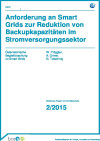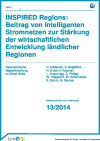Suchergebnisse für "Factsheet: Energietechnologien gestalten, die für alle sinnvoll und nutzbar sind"
Digitization in the construction and real estate industry
In the multitude of digital possibilities, it is very difficult to maintain an overview, to assess trends and potentials, and to recognize correlations. This report therefore aims to describe the current state of the art and the market assessment of promising digital technologies. Information is provided on concrete use cases, added value and challenges of the respective technologies. The analyses presented serve to assess the potential and set the strategic course for the integration of the currently most important digital technologies in the construction and real estate industry.
CO-MOD - Increasing comfort and energy efficiency through improved lighting and air quality in schools - implementation through modular EPC-models and ESCO-networks
In general local educational institutions such as schools and kindergardens have a high average demand for improved comfort and energy efficiency improvements. CO-MOD develops a flexible, modular concept (with provider networks, various financing options incl. "Grandmother"-Energy Services, contract modules) that can also respond to the individual circumstances of smaller objects.
ReCon: Development of a resilient hook-and-loop-fastening-system for the adaptable assembly of building components in the building industry
Systemic examination of the hook-and-loop fastener and building component interfaces for the development of a resilient fastening system between parts/components with different functions and lifespan. The desired result serves to verify the fastening system and forms a basis for further research and establishment in the building industry.
PVOPTI-Ray, Optimization of reflecting materials and photovoltaics in urban environment with respect to energy balance and bioclimate.
Within the scope of the project PVOPTI_Ray the influence of reflection and energy balance on the performance of building integrated photovoltaics (PV) in complex urban environment have been investigated. Equally the influence of PV modules and of the energy conversion of solar energy at the PV module surface has an impact on micro climate and therefore also on pedestrians who are exposed to the radiation fluxes. This was also investigated.
Anforderung an Smart Grids zur Reduktion von Backupkapazitäten im Stromversorgungssektor

Österreichische Begleitforschung zu Smart Grids
Schriftenreihe
2/2015
W. Prüggler, A. Ortner, G. Totschnig
Herausgeber: BMVIT
Deutsch, 61 Seiten
Downloads zur Publikation
Secondary Materials in the Austrian Textile Industry - Study with Recommendations for the Austrian R&D-Politics
This study deals with the challenges and potentials for the use of secondary materials in the Austrian textile industry. It identifies challenges and potentials for establishing cycles in the textile industry with a focus on the use of secondary materials in Austria based on broad stakeholder involvement. Based on this, recommendations for research and development activities were formulated to promote recycling.
homeVALUE

The ecology and economy of housing. An assessment system for the evaluation of the suitability of buildings and housing estates for the future.
IEA Bioenergy Webinar Series: Integration of gasification processes in biorefineries
30. June 2022
Online, AT
A webinar on how gasification technology can be used in existing industries/biorefineries.
KoPro Lzk+ - Cost and process optimization in the life cycle of nearly zero energy buildings
The aim of the project was to develop a continuous process chain for the energetic-economic optimization of zero and plus energy buildings. The project focused on proven and new approaches to cost reduction of nearly zero energy buildings (nZEBs) at all stages of the life cycle. The main goal was to identify the extra-costs for nZEBs, and to promote innovative approaches taking into account the cost-effectiveness for all the Stakeholders. A database containing important cost parameters and potential savings will be developed.
Bio-Minimum-Lubrication
Development of a Minimum quantity lubrication system employed in metal working industry using an oil-in-water emulsion based on renewable primary products.
e80^3-Buildings - "reconstruction concepts towards energy plus house standard with prefabricated active roof and facade elements, integrated home automation and network integration"
The project aims for highly-efficient renovation of existing buildings and settlements in urban areas. The main focus are buildings that were built between 1950 and 1980.
Energy Demand by Households and Household Characteristics
Analysis of private households' energy expenditures and interrelations between socio-economic characteristics and energy consumption
smartEXT - extended application boundaries for proven passive house technology
The present study aims to explore the application options for compact units (ventilation devices including micro heat pumps, developed for passive houses) in low energy buildings. Compact ventilation units for heat recovery, heating and domestic hot water shall bear the basic heating load, whereas peak loads shall be covered by newly-developed auxiliary heating equipment combined with intelligent control algorithms. This allows increased energy efficiency as well as cost effectiveness together with higher living quality and lower ecological load.
INSPIRED Regions: Beitrag von intelligenten Stromnetzen zur Stärkung der wirtschaftlichen Entwicklung ländlicher Regionen

Österreichische Begleitforschung zu Smart Grids
Schriftenreihe
13/2014
H. Aliefendic, S. Beiglböck
Herausgeber: BMVIT
Deutsch, 81 Seiten
Downloads zur Publikation
Smart Metering consumption
The project Smart Metering consumption focused on the energy consumption of the future smart metering infrastructure - an issue not widely discussed until now.
Business model innovations for rental and service models in the manufacturing sector
The project aims to contribute to a better understanding of the economic and ecological potentials of an implementation of lending and service models in the manufacturing sector in Austria and to show which changes and R&D efforts are necessary so that these can be realized by suitable business models.
Use of thermal cooling technologies and optimal combination with other heat energy consumers to use during summer the available district heating based on renewable energy sources: example of the municipality of Mureck
Optimal use of heating energy from a biogas CHP in the municipality of Mureck through demand side measures; the multifunctional energy centre Mureck on the way towards thermal air-conditioning: Multi-Mukli
P³Power - Plug&Play Storage of Photovoltaic Power
The core of the project P³Power is the measurement technology NetDetection, which is able to detect the power consumption of a household from any point, e.g. a regular wall socket. Based on this technology a plug&play powerplant, consisting of photovoltaics and battery pack, is realized. The system is able to guarantee 100% self-consumption within flexible aggregates (from single households to whole communes) without any changes of existing infrastructure. The measurement technology will be implemented into digital hardware, evaluated comprehensively in lab and household environment and subsequently new energy service business models are developed.
SeasonalGridStorage - Innovative seasonale thermal storages for urban district heating grids
Sensible storages, which are currently used in district heating networks for seasonal storage of excess heat (e.g. from solar thermal or industrial waste heat), exhibit high space demand, investment costs and heat losses. Within this project, concepts for using innovative storage technologies, e.g. thermochemical storages (TCS) having high heat densities and enabling pressure- and lossless storage, were developed and analyzed on a technological, economic and ecological basis. Additionally, the regulatory framework has been evaluated.
EDEN - Developement of a structured data and preparation documentation with a minimized error-proneness for energy performance cerificates.
Current energy performance certificates hold major flaws. Therefore, the presented research initiative aimed at the development of a standardized and easy-to-use, generic Input-Data-Documentation, which ensures the quality of energy certificates for all involved stakeholders. During the development, the documentation had been conducted and for a chosen sample of representative buildings, which is expected to demonstrate the high potential of such a development.
